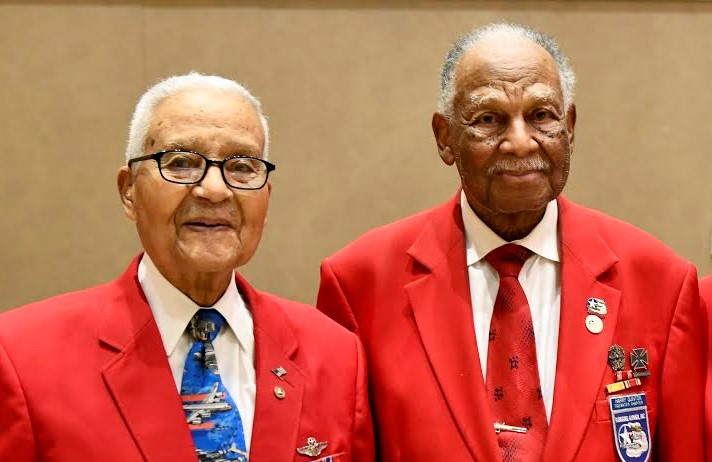
Monday, November 11, 2019
Veterans’ Day 2019 was a red-letter day for the University of Maryland Eastern Shore. Actually, “Red Tail” day is more accurate.
Two charter members of the legendary Tuskegee Airmen, including an Eastern Shore native, visited campus to share wisdom and insights from their experiences as patriot-pioneers in the mid-20th century when blacks struggled for the right to serve on the front lines in the nation’s military.
Col. Charles E. McGee, at age 99 the oldest (documented original) Tuskegee Airman, was joined by Dr. Harry Quinton as the featured speakers at a 90-minute program paying tribute to their military service.
McGee, who lives in Bethesda, is among the nation’s most celebrated 20th century military pilots; he flew 409 combat missions in three wars – World War II, Korea and Vietnam.
According to his daughter, McGee relishes speaking at events organized specifically for youth. The Nov. 11 event in UMES’ 510-seat Student Services Center theatre was just such an occasion.
“I enjoy meeting and talking to young people,” McGee said. “It’s so important to have them understand what we went through to defend our country.”
“And …,” McGee said with a twinkle in his eye, “it keeps me out of a rocking chair.”
McGee flew 136 combat missions in World War II planes piloted by blacks and painted with red tails for identification purposes, symbolism that endures today. McGee and engine mechanic Quinton, born in nearby Salisbury, sported fire-engine red hopsack sports jackets adorned with service medals and ribbons during their UMES appearance.
While McGee went on to a 30-year career in the military, retiring in 1973, Quinton served just three years in the old U.S. Army Air Corps.
When a teen in the audience asked about their most rewarding memory as Tuskegee Airmen, Quinton didn’t mince words.
“My discharge,” he said, later explaining the discrimination he experienced as an enlisted man stationed in Augusta, Ga., where he saw prisoners of war receiving better treatment and benefits at the post exchange than did he and his peers.
“I’ve never forgotten that,” Quinton said, “I never will.”
Fitted with a wireless microphone, the soft-spoken McGee credited four “pillars” he strove to live up to be successful; be perceptive, prepared, ready-to-perform and persevere.
“You’re the future of the country,” said McGee, who was an Eagle Scout.
Quinton offered a sobering perspective on his military experience.
“If we had refused to go, that would have set our race back a hundred years,” he said. “We’re making progress, but we didn’t get there, yet.”
The Airmen’s appearance doubled as a celebration; McGee turns 100 on Dec. 7 and seven days later, Quinton will be 94. The audience serenaded them with “Happy Birthday,” and then an encore.
“He’s my hero,” Quinton said of McGee. “Always has been.”
The visit by McGee and Quinton was arranged by Young Elites of the Eastern Shore West-to-East Coast Aviation Network, a non-profit educational program for Somerset County youth between the ages of eight-and-18 based at UMES that emphasizes careers in math, engineering, technology and science.

